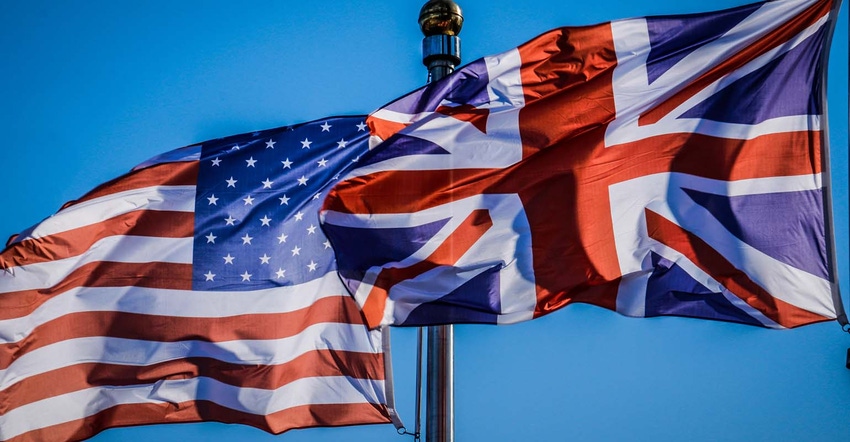
by Svenja O'Donnell, Thomas Penny and Charlotte Ryan
U.K. Trade Secretary Liam Fox was in Washington hunting for a trade deal and despite the enthusiastic endorsement over Twitter by U.S. President Donald Trump, his trip got bogged down by chlorinated chicken.
Flaunting the “special relationship” with the Americans masks the reality that any trade deal will take years and run into all sorts of difficulties, from clashing regulatory practices to the powerful farming lobby. The media storm back in London over how U.S. hygiene rules allow chicken to be washed in chlorine offers a glimpse of the battles in store.
The differences over chicken put Fox on the spot -- he decried the “ obsession” with the issue -- when all he wanted to do was put away government splits over Brexit and talk up the potential of the U.K. leaving the European Union and being a free agent. Much of his two days was spent insisting that the U.K. would not be pushed around.
“We’re setting U.K. conditions, U.K. standards,” said Fox in an interview with Michael McKee on Bloomberg Television. “We’re neither going to be members of the European Union nor are we totally bound to the United States.”
Fox published an 871-page report in Washington on Tuesday highlighting U.K. trade and investment in the 435 congressional districts, pointing out that Britain is one of the top five exports markets for 302 of the districts. Fox said the U.K.-U.S. working group on trade would “work to provide certainty for businesses as the U.K. leaves the EU and look to expand future trading links with the U.S.”
Despite Britain’s enthusiasm for a deal with the U.S., Fox promised that U.K. standards would not be relaxed. The gap between EU and U.S. standards was one of the factors behind the failure to agree a trade deal. Britain will want to avoid a similar failure, but its consumers are mindful of food hygiene following the mad cow disease outbreak in the 1980s.
Agricultural interests have historically always held a big sway over U.S. politics on environmental regulation and trade. Disputes over farm subsidies helped derail the Doha Round of world trade talks and the U.S. sugar program slowed adoption of the Trans-Pacific Partnership that Trump then ditched.
Farming areas are over-represented in the Republican coalition that elected Trump, meaning that influence may be even stronger now.
‘Big and Exciting’
Moreover, when Trump tweets about a potentially “big and exciting” trade deal, it’s worth noting the countries have very different notions about the scale of exports to each other.
Trump frequently rails against the trade deficit as evidence that America no longer wins. Fox pointed to the “relatively good trade balance” between the two countries as a reason for optimism and said 700,000 U.S. jobs are supported by trade with Britain.
Trade between the U.S. and the U.K amounted to a surplus 37 billion pounds ($48 billion) a year as of 2015, according to Britain’s statistics office. By contrast, the U.S. Bureau of Economic Analysis calculated a surplus of $11.9 billion in the same year.
Not Before 2019
The U.S. leader has attacked the EU’s attitude to transatlantic trade and called for it to drop barriers to commerce. Once Britain leaves the bloc it will be free to negotiate its own trade deals with countries around the world -- but that won’t be until March 2019 at the earliest.
“Working on major Trade Deal with the United Kingdom,” Trump wrote in a Tweet on Tuesday. “Could be very big & exciting. JOBS! The E.U. is very protectionist with the U.S. STOP!”
Economists and trade specialists have warned any deal will be difficult to deliver because U.S. negotiators have more experience and could bulldoze the U.K. on issues such as agricultural and financial regulation. Environmentalists and lawmakers worry about Britain’s strict food regulations being relaxed.
A report by the upper chamber of the U.K. Parliament said British farmers risk losing out to cheaper, imported food after leaving the EU if ministers don’t retain strict standards for animal welfare. U.K. farms have some of the world’s highest welfare standards, but also higher production costs.
Finally, even businesses don’t want the U.K. to rush into a deal and forget its top priority. Carolyn Fairbairn, director general of the Confederation of British Industry, was clear: “Our members put the European Union negotiations first.”
--With assistance from Andrew Mayeda and Alan Bjerga.
To contact the reporters on this story: Svenja O'Donnell in London at [email protected]; Thomas Penny in London at [email protected]; Charlotte Ryan in London at [email protected]
To contact the editors responsible for this story: Flavia Krause-Jackson at [email protected]
Sarah McGregor
© 2017 Bloomberg L.P
About the Author(s)
You May Also Like




